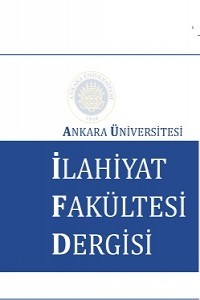Aquinas'ın Eleştirileri Bağlamında İbn Sīnā'nın Sudûr Nazariyesinin Değerlendirilmesi
An Analysis of Ibn Sīnā s Theory of Emanation in Light of Aquinas Criticisms
___
- Acar, Rahim. Avicennas Position Concerning the Basis of the Divine Creative Action, The Muslim World 94 (2004), ss.65-79.
- ----------. Creation: A Comparative Study Between Avicennas and Aquinas Positions, Doktora Tezi, Harvard Üniversitesi, Cambridge, MA, 2002.
- Aquinas, Thomas. On Power of God. terc. Richard J. Regan, New York: Oxford University Press, 2012.
- ----------. Summa Theologica, 5 c. Terc. Fathers of the English Dominican Province. Notre Dame: Ave Maria Press, 1998.
- ----------. On the Truth of the Catholic Faith: Summa Contra Gentiles. Terc. Anton C. Pegis New York: Doubleday & Company, Inc., 1956.
- ----------. On Truth. Terc. R. Mulligan, J. McGlyn and R. Schmidt. Chicago: Henry Regnery Co., 1952.
- ----------. On the Eternity of the World (De Aeternitate Mundi). İng. terc. T. Robert Miller, 1991-97. http://dhspriory.org/thomas/DeEternitateMundi.htm (11.06.2015).
- ----------. Sicriptum super Libros Sententiarum Magistri Petri Lombardi. Roma: Editiones Collegii S. Bonaventurae ad Claras Aquas, 1971-81.
- Aristoteles. Metaphysics. İngilizce terc. Richard Hope. Ann Arbor: The University of Michigan Press, 1960.
- ----------. The Basic Works of Aristotle, ed. Richard McKeon. New York: Random House, 2001.
- Atay, Hüseyin. Farabi ve İbn Sinaya Göre Yaratma. Ankara: Ankara Üniversitesi İlâhiyat Fakültesi Yayınları, 1974.
- Beatrice, H. Zedler, Saint Thomas and Avicenna in the De Potentia Dei, Traditio 6 (1948), ss.105-159.
- ----------. İbn Sinada Varlık Nazariyesi. Ankara: Kültür Bakanlığı Yayınları, 2001.
- Bolay, Süleyman Hayri. Akıl, Diyanet İslâm Ansiklopedisi (DİA), c.2, ss.238-242.
- Burrell, David B. Creation and Emanation: Two Paradigms of Reason, David B. Burrell and Bernard McGinn (ed.), God and Creation: An Ecumenical Symposium (Notre Dame, IN: University of Notre Dame Press, 1990), içinde, ss.27-37.
- ----------. Knowing the Unknowable God: Ibn-Sina, Maimonides, Aquinas. Notre Dame, IN: University of Notre Dame Press, 1986.
- Costa, DAncona. The Origin of Islamic Philosophy, Lloyd P. Gerson (ed.), The Cambridge History of Philosophy in Late Antiquity (Cambridge University Press, 2012) içinde, ss.869-893.
- Erdem, Engin ve Necmettin Pehlivan. Varlığın ve Yokluğun Ötesi: Kemalpaşazâdenin Leys ve Eysin Anlamının İncelenmesine Dair Risâlesi, İslam Araştırmaları Dergisi 27 (2012), ss.87-116.
- el-Ġazālī. Tehāfutul-Felāsife. Tah. Suleymān Dunyā. Kahire: Dārul-Me ārif, 1980.
- Gilson, Etienne. The Spirit of Mediaeval Philosophy. Terc. A. H. C. Downes. South Bend: University of Notre Dame Press, 1991.
- Goodman, L. E. Three Meanings of the Idea of Creation, David Burrell and Bernard McGinn (ed.), God and Creation (Notre Dame: University of Notre Dame Press, 1990) içinde, ss.85-113.
- Houser, R. Edward. Avicenna, Aliqui, and the Thomistic Doctrine of Creation, Recherche de Théologie et Philosophie Médiévale 80:1 (2013), ss.17-55.
- İbn Sīnā. El-İşārāt vet-Tenbīhāt bi-Şerḥiṭ-Ṭūsī. 4 c. Tah. Suleymān Dunyā, 2. Bsk. Kahire: Dārul-Me ārif, 1960.
- ----------. Et-Ta liḳāt. Tah. Abdurraḥmān Bedevī. Kahire: el-Hey etul-Miṣriyyetul-Āmme lil-Kitāb, 1973.
- ----------. Kitābuş-Şifā : el-İlāhiyyāt. 2 c. Tah. G. C. Anawātī, Sa īd Zāyed. Kahire, 1960.
- ----------. Kitābun-Necāh. Tah. Mācid Faḫrī. Beyrut: Dārul-Āfāḳil-Cedīde, 1985.
- ----------. er-Risāletul- Arşiyye, Mecmū ur-Rasā il (Ḥaydarābād: Dā iratu-l Me ârifil- Us̠ māniyye, 1354) içinde, ss.2-19.
- ----------. The Metaphysica of Avicenna (ibn Sīnā): A critical translation-commentary and analysis of the fundamental arguments in Avicenna's Metaphysica in the Dānish Nāma-i alā ī (The Book of Scientific Knowledge). New York: Columbia University Press, 1973.
- Lee, Patrick. The Relation between Intellect and Will in Free Choice According to Aquinas and Scotus, The Thomist 49 (1985), ss.321-340.
- Marmura, Michael. Some Aspect of Avicennas Theory of Gods Knowledge of Particulars, Journal of American Oriental Society 82 (1962), ss.299-312.
- Morewedge, Parviz, The Logic of Emanationism and Ṣūfism in the Philosophy of Ibn Sīnā (Avicenna), Part II, American Oriental Society 92:1 (1972), ss.1-18.
- Nasr, Seyyed Hossain. An Introduction to Islamic Cosmological Doctrine. Cambridge: Harvard University Press, 1964.
- Pegis, Anthon. St. Thomas and the Origin of Creation, F. X. Canfield (ed.), Philosophy and the Modern Mind (Detroit: L. Sacred Heart Seminary, 1961) içinde, ss.49-65.
- Plotinus. Enneads. İngilizce terc. Stephen Mackenna, with an introduction by Poul Henry. London: Oxford Univesity Press, 1991.
- Sorabji, Richard. Matter, Space, and Motion. London: Duckworth, 1988.
- Velde, Rudi te. Aquinas on God: The Divine Science of the Summa Theologiae (Ashgate Studies in the History of Philosophical Theology). Aldershot: Ashgate Publishing Company, 2006.
- Wickens, G. M. Some Aspects of Avicennas Work, G. M. Wickens (ed.), Avicenna: Scientist and Philosopher (London: Luzac, 1952) içinde, ss.49-65.
- Wippel, John F. Metaphysical Themes in Thomas Aquinas (Studies in Philosophy and the History of Philosophy vol.10). Washington, DC: The Catholic University of America Press, 1988.
- ----------. Metaphysical Themes in Thomas Aquinas II (Studies in Philosophy and the History of Philosophy vol.47). Washington, DC: The Catholic University of America, 2007.
- Zaehner, Robert Charles. The Dawn and Twilight of Zoroastrianism. New York: G. P. Putnams Sons, 1961.
- ISSN: 1301-0522
- Yayın Aralığı: 2
- Başlangıç: 1952
- Yayıncı: ANKARA ÜNİVERSİTESİ > İLAHİYAT FAKÜLTESİ
Temmām Ḥassān’ın Dil Anlayışı: Karineler Teorisi
Temmām Ḥassān'ın Dil Anlayışı: Karineler Teorisi
Aquinas’ın Eleştirileri Bağlamında İbn Sīnā’nın Sudûr Nazariyesinin Değerlendirilmesi
Ādābu'l-Baḥs̱ Devrimine Doğru Son Evrim: Burhānuddīn en-Nesefī'nin el-Fuṣūl'ü
Hadi Ensar CEYLAN, Necmettin PEHLİVAN
4. Uluslararası SEECHAC Kolokyumu (16-18 Kasım 2015, Heidelberg)
Aquinas'ın Eleştirileri Bağlamında İbn Sīnā'nın Sudûr Nazariyesinin Değerlendirilmesi
